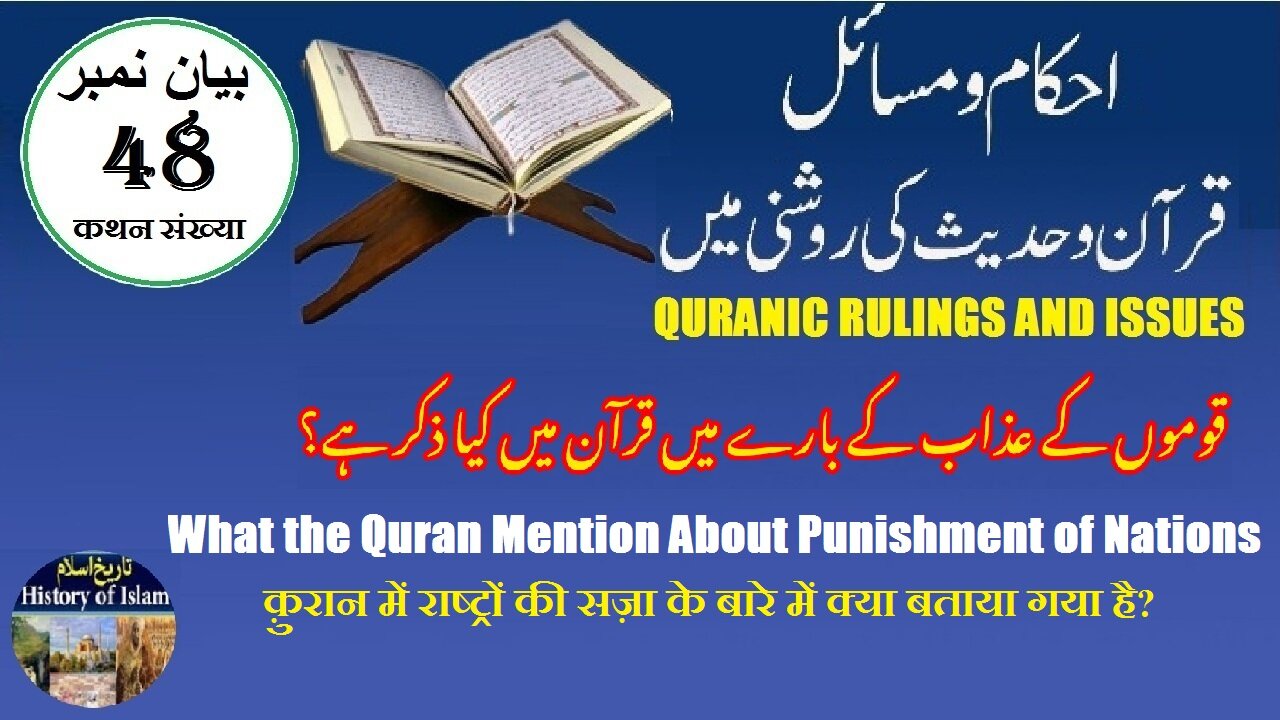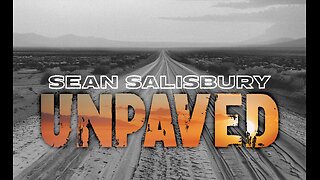Premium Only Content

What the Quran Mention About Punishment of Nations | قوموں کی سزا کے بارے میں قرآن میں کیا ذکر ہے؟
@islamichistory813 #what #does #the #quran #mention #about #the #punishment #of #nations #islamicbayan #seriesofstatement #statement48 #bayan48
What Does the Quran Mention About the Punishment of Nations?
Assalamu Alaikum sisters, brothers, friends and elders:
We welcome you to Statement Number 48 in our series of statements. We will explain in it that: (What Does the Quran Mention About the Punishment of Nations? ), our aim is to learn and teach from the Quran and Sunnah, reflect on history and seek solutions to problems with divine guidance.
The Holy Quran is a timeless guide that not only teaches faith and morality but also narrates the fate of past nations. These stories are not given as mere history; rather, they serve as lessons and warnings for humanity. One of the recurring themes in the Quran is the punishment of nations who rejected the message of their prophets, indulged in arrogance, and persisted in wrongdoing. These accounts highlight Allah’s justice, His patience, and the ultimate consequences of disbelief and corruption.
The Quran makes it clear that no nation is destroyed without warning. Allah always sent prophets and messengers to guide their people. When the message was continuously denied and rejected, punishment followed. Allah says, “And We never punish until We have sent a messenger” (Surah Al-Isra 17:15). This verse affirms that divine punishment is never unjust; it comes only after clear guidance and proof has been provided.
One of the most well-known examples is the people of Nuh peace be upon him. For centuries, Prophet Nuh called his people to worship Allah alone, but they mocked him and turned away. Finally, Allah sent the great flood. The Quran says, “So We opened the gates of the heaven with pouring water, and caused the earth to gush forth with springs, so the waters met for a matter already predestined” (Surah Al-Qamar 54:11-12). This destruction highlights that persistent rejection of the truth invites divine wrath.
Another example is the people of Aad, who were known for their strength and might. They were warned by Prophet Hud peace be upon him, but their arrogance blinded them. Allah says, “So We sent upon them a screaming wind during days of misfortune to make them taste the punishment of disgrace in worldly life, but the punishment of the Hereafter is more disgracing, and they will not be helped” (Surah Fussilat 41:16). Their story reminds humanity that power and wealth cannot save a nation when it rebels against its Creator.
Similarly, the people of Thamud were blessed with advanced skills in carving homes in mountains. Prophet Salih peace be upon him warned them and gave them a sign from Allah in the form of a she-camel. Yet, they killed the camel and rejected the truth. The Quran says, “So the earthquake seized them, and they became within their home corpses fallen prone” (Surah Al-Araf 7:78). This shows how ingratitude and defiance led to their destruction.
The story of Pharaoh and his people is also repeated in the Quran as an example of oppression and denial. Pharaoh enslaved the Children of Israel, spread corruption, and arrogantly declared himself as the supreme lord. Despite witnessing miracles, he remained defiant. Allah says, “So We took him and his soldiers and threw them into the sea. So see how was the end of the wrongdoers” (Surah Al-Qasas 28:40). Pharaoh’s punishment shows that no ruler, however mighty, can escape divine justice.
The people of Lut peace be upon him were punished for their immorality and rejection of the prophet’s call to righteousness. The Quran says, “And We rained upon them a rain of stones. Then see how was the end of the criminals” (Surah Al-Araf 7:84). This demonstrates that corruption in morality and society can lead to devastating consequences when a community crosses all limits.
The Quran also emphasizes that Allah’s punishment is not limited to physical destruction but can manifest in different forms such as drought, famine, or disunity. Allah says, “And We certainly seized them with suffering, but they did not yield to their Lord, nor did they humble themselves” (Surah Al-Muminun 23:76). This indicates that hardship is also a warning and a chance for repentance before final destruction comes.
At the same time, the Quran makes it clear that Allah’s mercy is greater than His punishment. Nations were punished only after long periods of patience and repeated warnings. Allah says, “And your Lord would not destroy the towns until He had sent to their mother town a messenger reciting to them Our verses. And We would not destroy the towns except while their people were wrongdoers” (Surah Al-Qasas 28:59). This highlights Allah’s justice, ensuring that punishment is never arbitrary.
The Prophet Muhammad peace be upon him also emphasized the lessons of these stories. In Sahih Bukhari, he said: “The example of my nation is like that of a man who kindled a fire, and moths and insects started falling into it. I am holding you by your waistbands to keep you away from the fire, but you insist on falling into it” (Sahih Bukhari, Hadith 6483). This hadith explains that the fate of earlier nations serves as a warning so that the Muslim Ummah does not follow the same path of destruction.
Another narration in Sahih Muslim states: “When people see evil and do not stop it, soon Allah will send His punishment upon them all” (Sahih Muslim, Hadith 177). This shows that divine punishment can also come upon a nation if wrong becomes widespread and unchecked.
In conclusion, the Quran mentions the punishment of nations to remind humanity of the consequences of arrogance, oppression, disbelief, and moral corruption. These stories are not tales of the past but timeless lessons. They teach that guidance always precedes punishment, that power and wealth cannot protect a nation from divine justice, and that Allah’s mercy delays destruction until every chance of repentance is exhausted.
The destruction of past nations stands as a warning for all future generations. It calls on humanity to live with humility, gratitude, and obedience to Allah. The Quran presents these accounts as a mirror for societies to reflect upon their own state, for indeed the same Lord who punished nations of the past is watching over the nations of today. The wise are those who learn from history and turn back to Allah before it is too late.
We conclude today's discussion with this humble supplication: O Allah, purify our hearts, accept our deeds, forgive our sins, and include us among Your grateful servants. Amen
Allah Hafiz
#qurantafseer #hadithlessons #ilmdeen #quranwisdom #rozanabayan #sunnahteachings #imanibaatain #islamicknowledge #masailkaahal #quranstories #deenreminder #hadithseikhtalat #islamicsolutions #ilmokhikmat #dailybayan #sunnatseekhain #islamicevents #deenikahaniyan #quranmessage #islamiclessons #islamiwaqiat #bayanseries #quranreminder #islamicwisdom
==================================
-
 15:21
15:21
ISLAMIC HISTORY
1 day agoIslamic History Episode 263 A look at the Daulte Bani Buyya डोलते बनी बुय्याدولت بنی بویہ پر ایک نظر
5 -
 LIVE
LIVE
Glenn Greenwald
5 hours agoTucker Carlson Speaks at Turning Point, Prompting Cheers and Controversy; More Evidence of Israeli Atrocities Amid Fragile Ceasefire; Tommy Robinson Submits to Re-Education in Israel | SYSTEM UPDATE #536
4,667 watching -
 12:12
12:12
ARFCOM News
5 hours ago $0.29 earnedThe REAL Reason Glock Bent The Knee + Searched Just For OWNING A Gun?!? + Lemon's Cringe 2A Mistake
2104 -
 LIVE
LIVE
LFA TV
22 hours agoLIVE & BREAKING NEWS! | WEDNESDAY 10/22/25
671 watching -
 1:03:22
1:03:22
BonginoReport
3 hours agoAmerican Political Violence Rages On - Nightly Scroll w/ Hayley Caronia (Ep.161)
79.8K37 -
 LIVE
LIVE
The Jimmy Dore Show
2 hours agoTrump’s MIDDLE FINGER to US Beef Ranchers! Dem Senate Candidate COVERS UP N@zi Tattoo! w/Twila Brase
8,323 watching -
 6:13
6:13
Sean Unpaved
1 hour agoKalshi's Pick of the Day: Who Could Be Florida's Next HC?
1.06K2 -
 7:43:03
7:43:03
Dr Disrespect
9 hours ago🔴LIVE - DR DISRESPECT - BATTLEFIELD 6 KILL CHALLENGE - VS VISS
62.2K5 -
 16:16
16:16
Robbi On The Record
3 days ago $8.70 earnedThe Dark History of Halloween | What You Should Know
29.5K20 -
 LIVE
LIVE
Side Scrollers Podcast
3 days ago🔴FIRST EVER RUMBLE SUB-A-THON🔴DAY 3🔴PLAYING MIKE TYSON'S PUNCH OUT TILL I WIN!
1,247 watching